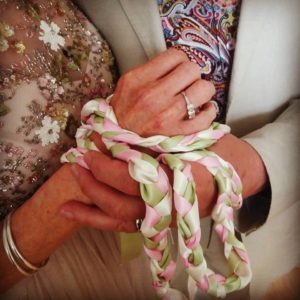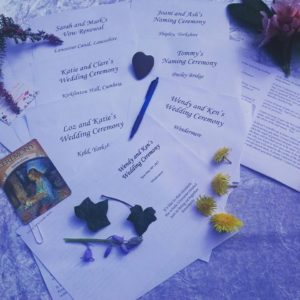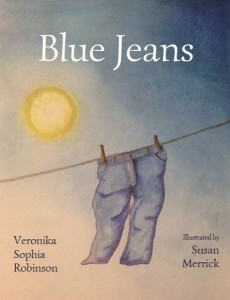By Veronika Robinson
Across the years, the question of whether children should be ‘allowed’ at funerals has remained a sensitive topic. There’s no definitive black-and-white answer, however, I would like to share the case for, and place of, children at funeral ceremonies.
A few years ago, my best friend ended her life. It coincided with the 40th anniversary of her late father’s passing. Over the course of our eighteen-year friendship, the one recurring story I heard was about how, as a ten-year-old, she’d been denied the right to attend his funeral. This, she said, had a life-long impact on her mental health. There was no closure. The emotions which bubbled up were quickly shut down. I’ve heard this story from many other adults who’d shared a similar experience. Let me say here, I fully understand that the adults who made those decisions for their children did so with the best possible intentions. They were endeavouring to protect. How were they to know the life-long impact?
Perhaps the question shouldn’t be so much as ‘should this child go to the funeral?’ but rather ‘will it help their healing and grief to share in this moment of remembrance and saying goodbye?’
Culturally, we have been taught to suppress feelings with comfort food, alcohol, shopping, sex, Netflix, endless scrolling of social media, and so it goes on. Why are we so scared of our feelings? Yes, crying (and grief) is exhausting. There can be anger, guilt, even betrayal at a loved one’s death. When someone dies, we each have our own experience of grief (no one can EVER know how you’re feeling). Because adults are often well-versed in how to ‘numb out’, it can be confronting to see a youngster who is fully in their feelings.
As a funeral celebrant, I’m acutely aware (at any ceremony, of any type) that it could be the first time someone goes to a ceremony or may be the last one they ever go to. And this applies to children, too. There’s an added responsibility (in my opinion) for the person leading the service to ensure it is child/age appropriate and sensitive. But more than that, it is a unique opportunity to show that in the face of loss, grief and tragedy there can be deep love shining out. And interwoven in our stories that we share on behalf of the family, are moments for crying, yes, but also for laughter or at the very least: gentle knowing smiles. However these emotions are expressed, they offer a release valve. Movement helps to assuage the fight-or-flight response.
Where possible, I will find ways for the children to be involved in the ceremony at a level that feels right for them. This can range from writing a few words, a poem, drawing a picture, helping decorate a coffin, or helping with a ritual. This active participation ensures they are at the heart of meaning-making, and will have the whole range of their tender and fragile feelings honoured.
At what age is it ok to allow a child attend? I’ve experienced every age at funerals from a nursing newborn whose father had died through to a crematorium full of toddlers(racing around the whole time), preschoolers and up to teenagers.
There is a difference between children attending because they knew the deceased as opposed to toddlers attending because their parent (who knows the chief mourner) doesn’t have a childminder. As ever, awareness and sensitivity of the mourning family and their ability to be fully present in the ceremony should be uppermost in your decision making.
When mourners attend a funeral, their focus is primarily on the person leading the ceremony and their loved one in the coffin or shroud. As a funeral celebrant, MY focus is not only on officiating the ceremony but I have full awareness of all the faces before me, whether it’s a small ceremony of two or one with 500 mourners. I’m constantly ascertaining the energy in the room, the body language of people, emotions being displayed or withheld, and the faces. It is a constant study of faces. I’ve had funerals where, the mother in me, just wanted to leave the lectern and wrap a crying child (whose mother was in the coffin) in my arms. That’s my natural instinct: to ease pain. To offer a balm. My job, however, is to offer healing in other ways. I do this through my word medicine, the kindness, care and authenticity I bring to the ceremonial space.
A number of my recent funerals have had quite a few children in attendance. The one thing which has really struck me with all the children was that they were 100% present. And this, I believe, is key. It means that in the liminal space of the funeral ceremony they were actively integrating everything that was happening. Their faces spoke to me of grief and devastation, yes, but ALSO of curiosity, love, tenderness and, at times, laughter.
Language is important. I never use words like ‘sorry for your loss’. Their loved one is dead, not lost. They’re not coming back. I might say “I’m so sorry for all the pain you’re going through.” I use words like death and dying because this is the reality. For the same reason, I don’t talk of a “baby born sleeping” (unless the parents want those words).
Life on Earth is transient. We only need to look to the season of Autumn to see that even Nature has her endings. This isn’t about being cold or harsh, but the opposite. The kindest thing we can do for any grieving person is to stand in a state of love and grace. To do so, means we’re less likely to choose the wrong words or try to cover over the reality of the situation. We’re offering our presence. We’re there to listen or to gently reflect the memories they’ve shared with us.
My role as a funeral celebrant is to hold the space. The energy I bring to the ceremony is one of inclusivity and kindness. This is a safe space in which to allow children a place to honour their feelings around a loved one’s death. If a celebrant can reverently reminisce about their loved one, and show the panoramic view of their life, followed by the gentlest of goodbyes, steeped in the reality of a physical ending, this will help a child on their path of healing. As adults, this is what we’d want for ourselves. Let us extend the gift of grief awareness to children, too.
Veronika Robinson is a Heart-led Celebrant in Cumbria who officiates across all rites of passage. She’s also co-tutor at Heart-led Ceremonies Celebrant Training, and editor of The Celebrant magazine.

















